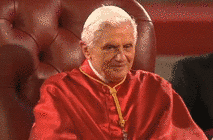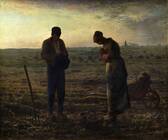
Papa Benedict XVI's Catechesis on Prayer
given at his Wednesday general audiences from May 2011 up until the Year of Faith in October 2012. To see all of them, click here.
Man in Prayer (I) 
L'uomo in preghiera 
BXVI: "Dear friends, in these examples of prayers from different epochs and civilizations emerges the awareness that the human being has of his condition as a creature and of his dependence on an Other superior to him and source of every good. The man of every age prays because he cannot help but wonder what is the meaning of his existence, which remains obscure and bleak, if it is not put in relation to the mystery of God and of his plan for the world. Human life is an intertwining of good and evil, of undeserved suffering and of joy and beauty, which spontaneously and irresistibly impels us to ask God for that light and inner strength which help us on earth and disclose a hope that goes beyond the confines of death. The pagan religions remain an invocation which, from the earth, awaits a word from Heaven. Proclus of Constantinople, one of the last great pagan philosophers, who lived in an epoch already fully Christian, gives voice to this expectation, saying: “Unknowable, no one contains you. All that which we think belongs to you. Our evil and our good are from you, our every yearning depends on you, O ineffable one, whom our souls feel present, raising to you a hymn of silence” (Hymni).
In the examples of prayer of various cultures, which we have considered, we can see a testimony of the religious dimension and of the desire for God inscribed in the heart of every man, which find fulfilment and full expression in the Old and New Testaments. Revelation, in fact, purifies and brings to its fullness man’s original longing for God, offering him, in prayer, the possibility of a deeper relationship with the heavenly Father.
At the beginning of our pathway in the “School of prayer” we therefore wish to ask the Lord to illuminate our minds and hearts so that the relationship with Him in prayer may be ever more intense, affectionate and constant. Once again, let us say to Him: “Lord, teach us to pray” (Lk 11, 1)."
Man in Prayer (II) 
L'uomo in preghiera 
BXVI: "Man is by his nature religious, he is homo religiosus just as he is homo sapiens and homo faber: “The desire for God” the Catechism further affirms, “is written in the heart of man, because man is created by God and for God” (n 27). The image of the Creator is imprinted on his being and he feels the need to find a light so as to give an answer to the questions that concern the profound meaning of reality; an answer that he cannot find in himself, in progress, in empirical science. The homo religiosus does not stand out only in the ancient worlds, he traverses the whole history of humanity. In this regard, the rich terrain of human experience has seen arise various forms of religiosity, in the attempt to respond to the desire for fullness and happiness, to the need for salvation, to the search for meaning. The “digital” man, like the cave man, seeks in the religious experience ways to overcome his finiteness and to secure his precarious earthly adventure. Moreoever, life without a transcendent horizon would not have a full meaning, and happiness, to which we all tend, is spontaneously projected towards the future, in a tomorrow that has yet to be accomplished. The Second Vatican Council, in its declaration Nostra Aetate, underlined it synthetically: “Men await from the various religions the answer to the hidden enigmas of the human condition which, yesterday as today, profoundly agitate the heart of man: the nature of man [ - who am I? - ], the meaning and purpose of our life, good and sin, the origin and purpose of suffering, the way to reach true happiness, death, judgement and retribution after death, finally the ultimate and ineffable mystery that surrounds our existence, from whence we draw our origin and towards which we tend” (n 1). Man knows that he cannot respond on his own to his fundamental need to understand. However much he has deluded himself and still deludes himself as being self-sufficient, he has the experience of not being sufficient to himself. He needs to open himself to the other, to something or to someone, who can give him that which he lacks, he must go out of himself towards the One who is able to fill the breadth and depth of his desire."
Meditation 
La Meditazione 
"She, who “believed” in the announcement of the Angel and made herself instrument so that the eternal Word of the Most High could be incarnated, also welcomed in her heart the wonderful prodigy of the human-divine birth, she meditated on it, she paused in reflection on what God was working in her, so as to welcome the divine will in her life and respond to it. The mystery of the incarnation of the Son of God and of Mary’s motherhood is so great that it requires a process of interiorization, it is not only something physical that God works in her, but is something that demands an interiorization on the part of Mary, who seeks to deepen its intelligence, to interpret its meaning, to understand its aspects and implications. Thus, day after day, in the silence of ordinary life, Mary continued to keep in her heart the successive marvellous events of which she was witness, all the way to the extreme test of the Cross and the glory of the Resurrection. Mary fully lived her existence, her daily duties, her mission as mother, but she knew how to maintain within herself an inner space to reflect on the word and will of God, on what was happening in her, on the mysteries of the life of her Son."
St Alphonsus Liguori & Prayer 
Sant'Alfonso Maria de' Liguori e la preghiera 
BXVI: "St Alphonsus describes prayer as “the necessary and safe means of obtaining salvation and all the graces we need to attain it”. In this sentence is summarized the Alphonsian way of understanding prayer.
First of all, by saying that it is a means, he reminds us of the end to be reached: God created out of love, so as to be able to give us life in fullness; but this goal, this life in fullness, because of sin has, so to speak, become distant — we all know it — and only God’s grace can render it accessible. So as to explain this basic truth and to make it understood with immediacy how real the risk of “being lost” is for man, St Alphonsus had coined a famous, very elementary maxim, which says: “The one who prays is saved, the one who does not pray is damned!”. To comment on this lapidary phrase, he added, “In conclusion, to save oneself without praying is most difficult, even impossible... but praying to save oneself is a sure and easy thing” (II, Conclusion). And he says further: “if we do not pray, we have no excuse, because the grace to pray is given to everyone... if we do not save ourselves, all the fault will be ours, because we will have not prayed” (ibid). Thus by saying that prayer is a necessary means, St Alphonsus wanted it to be understood that in every situation of life one cannot do without praying, especially in moments of trial and difficulty. We must always knock with trust at the door of the Lord, knowing that in everything He takes care of his children, of us. For this reason, we are invited not to be afraid to turn to Him and to present our requests to Him with trust, in the certainty of obtaining that which we need.
Dear friends, this is the central question: what is really necessary in my life? I respond with St Alphonsus: “Health and all the graces that we need for that” (ibid); naturally, he means not only the health of the body, but above all that of the soul, which Jesus gives us. More than anything else we need his liberating presence which renders our existence truly fully human and hence full of joy. And only through prayer can we welcome Him, his Grace, which, by illuminating us in every situation, makes us discern the true good and, by strengthening us, also renders our will efficacious, that is, renders it capable of carrying out the known good. We often recognize the good but are not capable of doing it. With prayer we come to accomplish/arrive at accomplishing it. The Lord's disciple knows he is always exposed to temptation and never fails to ask in prayer for God’s help, so as to overcome it."




